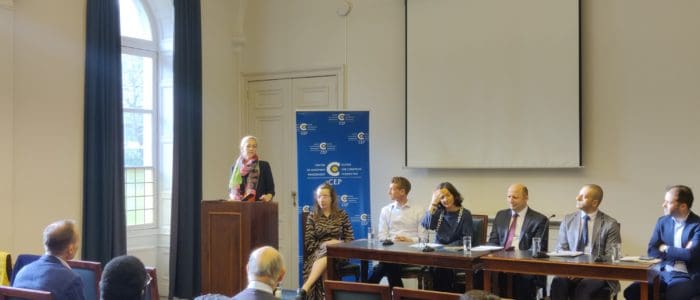Published
Event Summary: Improving Europe’s Competitiveness – Role of Open Markets, Emerging Technologies, and Strategic Alliances
By: Matthias Bauer Guifré Margarit i Contel
Subjects: Digital Economy European Union

Last April 8, we co-organised together with the Centre for European Perspective the event “Improving Europe’s Competitiveness – Role of Open Markets, Emerging Technologies, and Strategic Alliances” at the Palais des Académies in Brussels. The session revolved around a panel discussion that brought together several experts to delve into the challenges and opportunities facing the European Union in the context of global economic dynamics and technological advancements. The discussion centred on enhancing EU competitiveness through open markets, strategic alliances, and emerging technologies.
One of the speakers at the event was ECIPE director Dr Matthias Bauer, who provided critical insights into the regulatory landscape of the EU, emphasising the need for a balanced approach to digital regulation. He highlighted that while regulations are essential for ensuring safety and ethical standards, overly restrictive regulations hinder innovation and economic growth. Mr Bauer pointed out that the EU’s approach to digital regulation, particularly under the von der Leyen Commission, has shifted towards more laws and more complexity, leading to legal uncertainty, especially for small businesses. He noted, “The problem is that this new digital regulation is very much about laws, it’s not about guidance or self-regulation, it’s about more laws, it’s about more rules, more complexity, and therefore also about more legal uncertainty, especially for small businesses, which are deterred by legal obstacles.”
He also touched upon the importance of technology diffusion and adoption, noting that EU member states often lack conducive regulatory frameworks tailored to digital technologies. Instead, they rely on broader EU regulations, which can be cumbersome and stifle innovation. He argued for a more flexible regulatory environment that encourages the adoption of both EU and non-EU technologies that can boost economic activity within the EU.
In discussing the EU AI Act, Mr Bauer expressed concerns that the current regulatory framework will slow down innovation not only in ICT industries but across various sectors that could benefit from AI. He stated, “The AI Act is basically a consequence of the EU’s much-contested precautionary principles, of which we know that there has been a certain slowdown in our technology industries, like medical devices, applications, biotechnology, and so on and so forth.” He advocated for AI regulations that are strict enough to protect safety and fundamental rights but also flexible enough to foster innovation and investment in Europe.
His recommendations for the future included a call for regulatory adjustments that would strike a balance between ensuring safety and promoting innovation. He emphasised the need for EU member states to push for more harmonised and simplified regulations that reduce the burden on businesses. He also highlighted the importance of improving education and vocational training to align with labour market demands, thereby enhancing the skills and productivity of the European workforce.
In parallel, Karen Massin, Head Government Affairs and Public Policy – EU Institutions at Google, stressed the significant potential of digital technologies to enhance competitiveness in Europe. She highlighted the transformative power of AI and emerging technologies, noting a study that projects a potential increase of 2.1 trillion euros in the European economy through AI. Ms Massin advocated for increased investment in research and development (R&D), pointing out that currently, 80% of AI investments come from the US and China, with Europe lagging at 10%. She stated, “We need much more R&D, research and development money. I mean, if you look at AI, 80% of investments actually at the moment are coming from the US and China. Europe is 10%.”
Ms Massin also discussed the importance of transatlantic cooperation, emphasising that cybersecurity and AI are “team sports” requiring international collaboration. She called for policies that facilitate data flows and enhance cybersecurity measures, ensuring that Europe remains aligned with global standards.
David Brozina, Ambassador of the Slovenian Permanent Representative to the EU, highlighted the challenges specific to Central and Eastern European (CEE) countries. He pointed out that while these countries have traditionally relied on lower labour and energy costs to remain competitive, these advantages are diminishing. Ambassador Brozina emphasised the need to invest in skills and education to introduce high-tech industries in the region, noting, “Try to invest more in high-technology jobs, and be competitive with that.”
Guido Lobrano, Senior Vice President of Policy, Director General for Europe at the Information Technology Industry Council (ITI), echoed the need for regulatory stability and legal certainty for businesses. He emphasised the importance of implementing existing regulations effectively rather than constantly introducing new ones. Mr Lobrano stated, “We need to stop thinking the best thing to do is to regulate […] Companies need legal certainty.”
Alexandre Roure, Head of Policy and Deputy Head of Office at CCIA Europe, stressed the importance of maintaining an open market and avoiding protectionist tendencies. He highlighted the necessity of international partnerships and the alignment of EU regulations with global standards to foster innovation and economic growth.
Overall, the discussion underscored the importance of international cooperation and the need for the EU to align its digital policies with global standards to remain competitive. Director Bauer’s insights, along with the perspectives of Ms Massin, Ambassador Brozina, Mr Lobrano, and Mr Roure, provided a comprehensive roadmap for achieving a regulatory environment that supports innovation while maintaining ethical standards, crucial for enhancing the EU’s competitiveness in the global market.
The event was accompanied by the launch of a report with the same title that you can download clicking the button below: